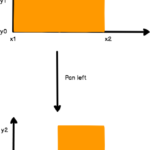Hi,
I’m working on the iOS and android version. I’m trying to implemented an animated visible range change on Y axis when zooming/panning X axis.
On iOS, I just have to do:
yAxis.autoRange = .always
yAxis.animateVisibleRangeChanges = true
yAxis.animatedChangeDuration = 0.5
But I can’t find a way to do that on Android, is it hidden somewhere else?
Kind Regards,
Alexis
- Alexis Durand asked 6 years ago
- last edited 6 years ago
- You must login to post comments
Hi Alexis,
Thanks for your inquiry.
Unfortunately we don’t have such properties in SciChart Android.
May I ask why do you need to animate VisibleRange on panning/zooming chart? I mean those modifiers should provide realtime updates of chart as you pan/zoom so I don’t understand why do you need to additionally animate those changes. Maybe if I understand your requirements then we can create some workaround for you.
Best regards,
Yura
- Yura Khariton answered 6 years ago
- You must login to post comments
Hi Yura,
The change of scale on the Y axis is instantaneous. So we the user is scrolling back and forth in the graph, the Y visible is updated automatically, but instantly, which makes the graph jumps between scale, and it’s really hard to follow what’s going on.
I attached a wireframe of a common flow for our data.
Everything is fine up to the last pan which makes the y visible range adapt instantly.
While the example could be fine, our data is a lot more complicated and those kind of jumps are extremely frequent.
When a user is panning left while being zoomed in a little, the graph scale keeps jumping and it makes it extremely confusing as to what scale you’re looking at.
Does that help clarifying the problem ?
That problem is solved on iOS since instead of instantly changing the scale, there’s a very short animation showing the user what’s going on.
Kind Regards,
Alexis
- Alexis Durand answered 6 years ago
- You must login to post comments
Hi Alexis,
Well you can try to customize zoom and pan modifiers and perform zoomExtents() when it’s required ( for this to work you need to remove AutoRange.Always for yAxis) :
class CustomPinchZoomModifier extends PinchZoomModifier {
private final Runnable zoomExtentsYRunnable = new Runnable() {
@Override
public void run() {
getParentSurface().animateZoomExtentsY(500);
}
};
@Override
public boolean onScaleBegin(ScaleGestureDetector detector) {
Dispatcher.cancel(zoomExtentsYRunnable);
return super.onScaleBegin(detector);
}
@Override
public boolean onScale(ScaleGestureDetector detector) {
Dispatcher.cancel(zoomExtentsYRunnable);
return super.onScale(detector);
}
@Override
public void onScaleEnd(ScaleGestureDetector detector) {
super.onScaleEnd(detector);
Dispatcher.postOnUiThread(zoomExtentsYRunnable);
}
}
class CustomZoomPanModifier extends ZoomPanModifier {
private final Scroller scroller;
private volatile boolean isFlingGesture;
private final Runnable zoomExtentsYRunnable = new Runnable() {
@Override
public void run() {
if (isFlingGesture)
getParentSurface().animateZoomExtentsY(500);
}
};
public CustomZoomPanModifier(Context context) {
this.scroller = new Scroller(context, new DecelerateInterpolator());
}
@Override
public boolean onDown(MotionEvent e) {
this.isFlingGesture = false;
Dispatcher.cancel(zoomExtentsYRunnable);
return super.onDown(e);
}
@Override
public boolean onScroll(MotionEvent e1, MotionEvent e2, float xDelta, float yDelta) {
final boolean result = super.onScroll(e1, e2, xDelta, yDelta);
Dispatcher.postOnUiThread(zoomExtentsYRunnable);
return result;
}
@Override
public boolean onFling(MotionEvent e1, MotionEvent e2, float velocityX, float velocityY) {
super.onFling(e1, e2, velocityX, velocityY);
// calculated how long inertial scroll will last and perform zoomExtents after inertial scroll
this.scroller.fling(round(e1.getX()), round(e1.getY()), round(velocityX), round(velocityY), Integer.MIN_VALUE, Integer.MAX_VALUE, Integer.MIN_VALUE, Integer.MAX_VALUE);
this.isFlingGesture = true;
Dispatcher.postDelayedOnUiThread(zoomExtentsYRunnable, scroller.getDuration());
return true;
}
}
final CustomZoomPanModifier zoomPanModifier = new CustomZoomPanModifier(getActivity());
final CustomPinchZoomModifier pinchZoomModifier = new CustomPinchZoomModifier();
pinchZoomModifier.setDirection(Direction2D.XDirection);
surface.getChartModifiers().add(sciChartBuilder.newModifierGroup().withModifier(zoomPanModifier).withModifier(pinchZoomModifier).build());
Please can you try it and let me know if it’s suitable for your needs?
Best regards,
Yura
- Yura Khariton answered 6 years ago
- You must login to post comments
Please login first to submit.

